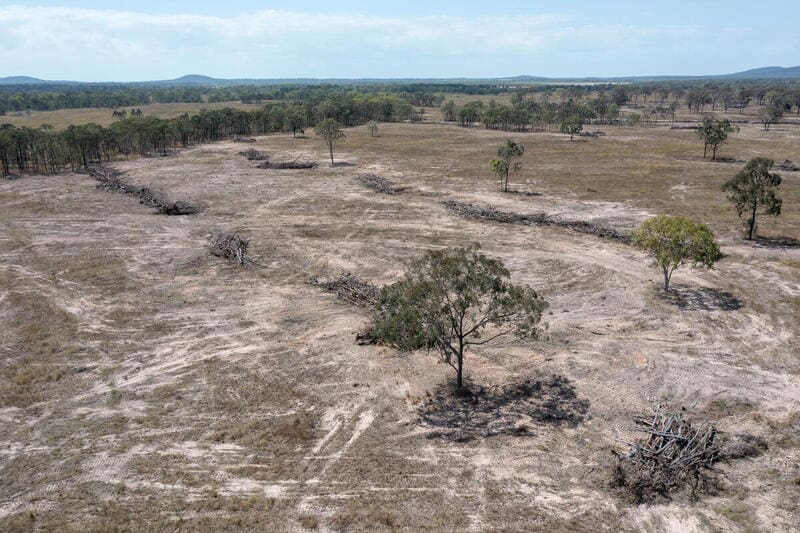WHILE the cattle industry is currently working its way through vegetation management legislation being imposed by companies and export markets, some have been asking “isn’t this a job for the Government?”
Cattle Australia is currently working through submissions to its draft definition of deforestation in the Australian context, in a bid to communicate routine land management practices to the European Union, banks and big supply chains who are all setting “deforestation-free” targets.
While there have been plenty of opinions about the way the industry should be handling the supply chain pressure, some have been asking what Australian Governments are doing to make sure their laws are not being completely negated.
Vegetation management has been a source of contention in Australian politics for decades, with Governments having to weigh up pressure from environmental groups with a range of other considerations within the electorate.
But as Dr Stephen Wiedemann from Integrity Ag & Environmental told a Beef 2024 forum, processors are now being pushed by the environmental groups to become “quasi-regulators” themselves by guaranteeing their customers that their beef is “deforestation free”.
Processors needing to assess specifications for customers down the supply chain is nothing new to the industry, the question is more about whether vegetation management laws should be left to the democratic process and not the boards of big companies. As one producer said earlier this week “we are a first world country after all”.
Both agriculture minister Murray Watt and Nationals leader David Littleproud have expressed concern about the EU restrictions. Minister Watt wrote the EU earlier this year calling on the union to delay the import regulations.
Mr Littleproud told Beef Central he was concerned about the flow-on effects of the deforestation targets.
“The Nationals are deeply concerned that an EU trade deal will be used as a stalking horse to enforce tougher vegetation management laws that will lead to agriculture-destroying changes,” he said.
“The Nationals are also concerned about Labor’s new climate-related financial disclosure policy, forcing entities to document their indirect greenhouse gas emissions, known as ‘Scope 3’. This unfair and bureaucratic burden comes despite Australian farmers already having some of the best land management practices in the world.”
Given the deforestation targets have been in the works since the Coalition was in power, Mr Littleproud was asked what the Government was doing.
“In Government, The Nationals introduced the Agricultural Biodiversity Stewardship program, which provided incentives and gave farmers the tools they needed to boost their environmental credentials in carbon sequestration and biodiversity.”
Agriculture minister Murray Watt was also asked what the Government was doing in response to incoming targets, this article will updated if there is a response.
But if the case of Westpac becoming the first Australian bank to set a deforestation target earlier this year is anything to go by, the Government and The Nationals appear to differ.
Mr Littleproud urged the Government to intervene saying “Governments set the laws – not the boards of big banks”. Minister Watt said the Government was not going to intervene in business decisions.
Where has the deforestation pressure come from?
Many familiar participants in the Australian vegetation management debate over recent decades are behind the “deforestation-free” targets.
One of the leaders is the WWF (World Wildlife Fund), which labelled Australia a “deforestation front” putting agricultural management in the eastern states alongside the clearing of the Amazon rainforest.
The WWF is also a founding organisation of the Science Based Targets initiative, which has signed on companies like McDonalds, Coles, Woolworths and processors – pushing them to set deforestation targets. It is also a founding member of the Accountability Framework initiative, which sets roadmaps and definitions for deforestation targets.
The organisation played a significant role in pushing the European Union down the deforestation-free line.
Other environmental groups have obviously seen benefit in calling for action on deforestation and painting the beef industry as the main cause of it.
Greenpeace, the Australian Conservation Foundation and the Wilderness Society have all been running campaigns and calling for tax deductable donations before the end of June. Greenpeace went as far as to superimpose koalas into McDonald’s burgers and into meat wrappers on supermarket shelves.
While calling for donations, the groups are also trying to influence the shareholders and boards of the big companies.
Former Global Roundtable for Sustainable Beef president and current executive committee member Ian McConnel told Beef Central earlier this year that the deforestation-free targets were different to other environmental initiatives because the companies were unlikely to use it as an advertising slogan, it was more about not being associated with it.
CA’s land management commitment is hoping to communicate Australian land management to the supply chains and banks, with the next draft due at the end of the month.

